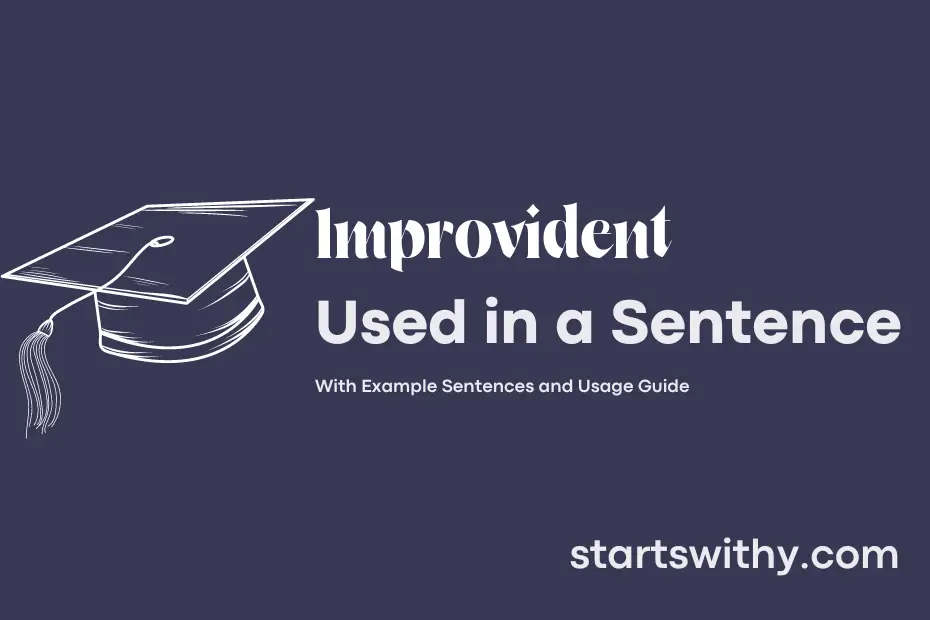Have you ever made a hasty decision without considering the consequences? That’s exactly what it means to be “improvident.” “Improvident” is an adjective used to describe someone who acts without thinking about the future impact of their actions, often displaying a lack of foresight or careful planning.
Individuals who are improvident tend to act rashly, focusing on immediate gratification rather than long-term goals or outcomes. This can lead to poor financial choices, impulsive behavior, and a disregard for potential consequences.
7 Examples Of Improvident Used In a Sentence For Kids
- Improvendit means spending money without planning.
- It’s important to be smart with money and not be improvident.
- Let’s save our pocket money instead of being improvident.
- Being improvident can lead to running out of money quickly.
- We should always think before spending to avoid being improvident.
- It’s wise to make a budget to prevent improvidence.
- Remember, being improvident can cause financial problems.
14 Sentences with Improvident Examples
- Improvident spending on unnecessary gadgets can lead to financial troubles for college students.
- It is important to avoid improvident dinner decisions and opt for budget-friendly options in the campus cafeteria.
- Taking out loans without proper planning can result in an improvident debt burden for students.
- Researching and comparing prices before making purchases can help avoid improvident spending.
- Improvident borrowing habits can lead to a cycle of debt that may be difficult to break free from.
- Skipping class without a valid reason is an improvident decision that can affect academic performance.
- Not creating a budget for monthly expenses can lead to improvident use of funds by college students.
- Prioritizing wants over needs can often result in improvident financial choices for students.
- Not investing in educational resources early on can be an improvident decision that affects future opportunities.
- Taking on too many extracurricular activities without considering the time commitment can be improvident for college students.
- Choosing a high-cost meal plan without considering cheaper alternatives can lead to improvident spending.
- Engaging in risky behaviors without considering the consequences can be improvident for college students.
- Lacking a backup plan for emergencies can result in improvident financial decisions during unexpected situations.
- Overlooking scholarship opportunities can be an improvident mistake for college students seeking financial aid.
How To Use Improvident in Sentences?
Improvident
To use Improvident in a sentence, you can start by describing someone’s behavior or actions that show a lack of foresight or planning. For example, “His improvident spending habits left him struggling to pay his bills at the end of the month.” Another way to use Improvident is to highlight someone’s failure to save or invest properly, like in this sentence: “Her improvident decisions led to financial troubles in the future.”
Additionally, you can also use Improvident to describe a situation or decision that lacks consideration for the future consequences. For instance, “The company’s improvident expansion strategy resulted in massive debt and layoffs.”
Remember that when using Improvident in a sentence, it is important to convey the sense of recklessness or shortsightedness associated with the word. By incorporating Improvident effectively, you can enhance your writing and communication skills by expressing a specific type of behavior that showcases a lack of prudent planning or foresight.
Conclusion
In summary, the sentences with the word “improvident” highlighted the consequences of reckless or wasteful behavior. Whether describing financial decisions, resource management, or planning for the future, these sentences emphasize the importance of being prudent and thoughtful in one’s actions. By showcasing the negative outcomes of improvident choices, these examples serve as cautionary tales on the significance of being responsible and forward-thinking.
Ultimately, the sentences featuring the term “improvident” underscore the need for careful consideration and foresight in decision-making. They highlight the risks associated with hasty, shortsighted actions and stress the benefits of being mindful and strategic in managing resources and planning ahead. By heeding these lessons, individuals can avoid the potential pitfalls of improvidence and strive for more secure and sustainable outcomes in various aspects of their lives.



